Anna Meares becomes youngest-ever SA Sport Hall of Fame ‘legend’
Australia’s most decorated track cyclist Anna Meares has become just the sixth athlete elevated to “legend” status in the SA Sport Hall of Fame: a crowning achievement recognising an illustrious career defined by resilience and triumph in the face of adversity.

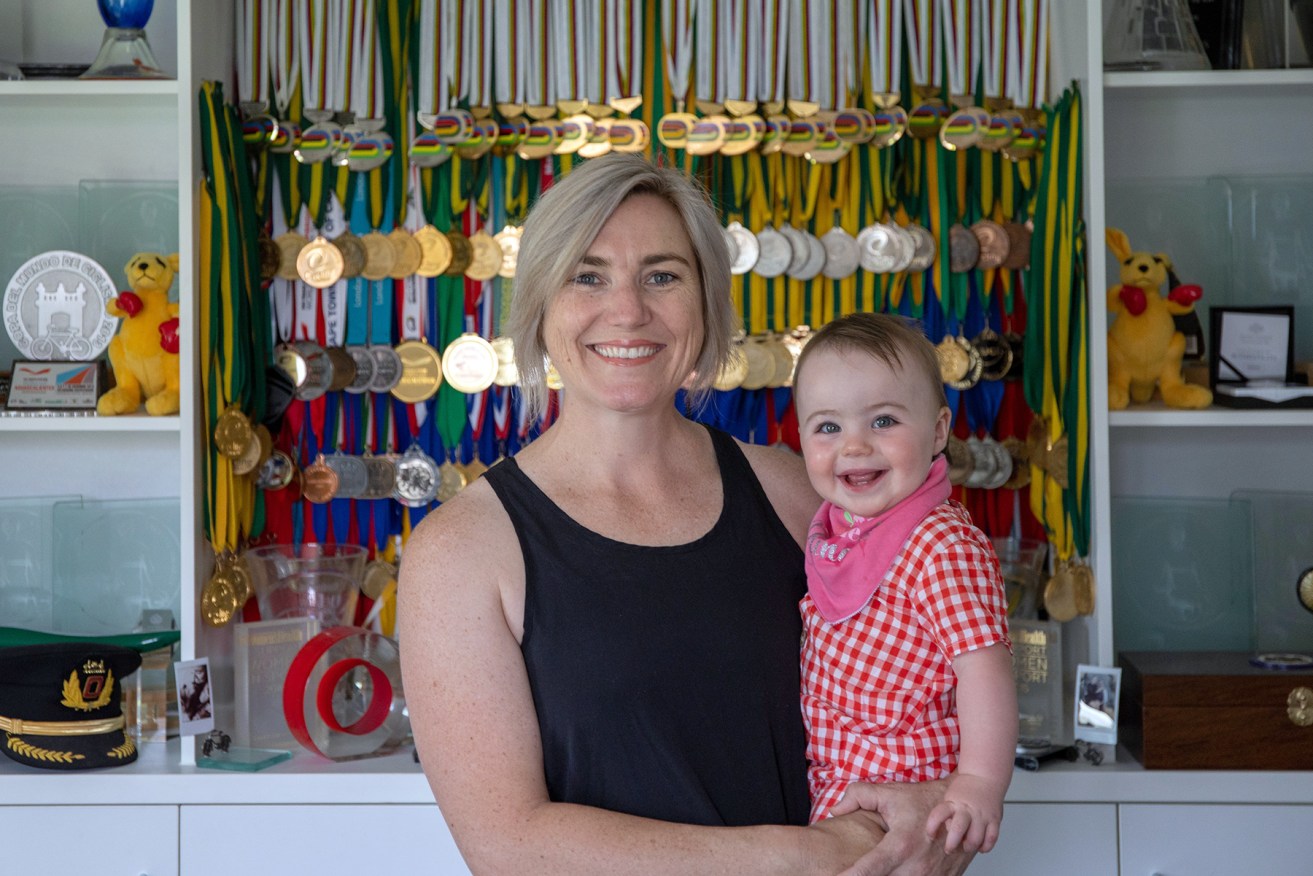
Anna Meares with baby Ev (Evelyn) and her huge haul of cycling medals. Photo: Tony Lewis/InDaily
Regarded by many as the greatest female track cyclist of all time, Meares is the only Australian athlete in history to win medals at four consecutive Olympic Games. Her performances at Athens 2004 through to Rio 2016 saw her win two golds, one silver and three bronze medals, alongside a prolific Commonwealth Games career (five golds, two silvers, one bronze) and 11 world championships titles.
Her career successes represented landmark moments in Australian cycling. As a 20-year-old, she won Olympic gold in the 500-metre time trial in Athens – becoming the first Australian female gold medallist in track cycling. During her 22-year career, she would set five world records in the event and become the first woman to break the 33-second barrier.
The Queensland-born cyclist’s most famous victory came in 2012, when she defeated long-time British rival Victoria Pendleton to win gold in the women’s sprint at the London Olympics – an event Meares and her team spent years preparing for after she finished second to Pendleton in Beijing four years earlier.
Meares was first inducted into the SA Sport Hall of Fame in 2018 just two years after her retirement from cycling. Now, at 37, she is the youngest ever to be elevated to legend status, joining Sir Donald Bradman, Bart Cummings, Barrie Robran, Victor Richardson and Gillian Rolton in an elite club reserved for athletes who have delivered “exceptional performances that are almost beyond belief” and “hold a revered place within the community”.
Meares said she is “still a little mind-blown” to be recognised in the company of South Australia’s sporting legends, and hopes to acknowledge all those who have contributed to her career success.
“For me, it’s a huge honour,” she told InDaily. “I feel very, very proud, and almost a little bit shy about it,
“I’m still a little bit mind-blown … given the quality and ‘the few’ who are already in the South Australian legends category.
“I know I’ve achieved some great things in my career, but I still just see myself as my normal old me, and those people to me are on such a pedestal that I think it’s just hard to kind of get my head around.
“I think it’s as big an acknowledgement of my sporting career, achievements and conduct that possibly could be given.”
Meares accepted the award at the SA Sport Hall of Fame induction dinner tonight, where five new members were also inducted into the hall of fame.
Weightlifter Heidi Taylor (Wittesch), Australian basketballer Julie Nykiel and tennis legend John Fitzgerald were all on hand to accept their induction, while Indigenous basketball pioneer Michael AhMatt and five-time Paralympic gold medallist Kieran Modra were recognised posthumously for their contributions to South Australian sport.
The night also saw Premier Steven Marshall and South Australian Governor Hieu Van Le unveil the new Hall of Fame Gallery at Adelaide Oval, which has been erected outside the Bradman Museum.
From country Queensland to the world stage
Meares, who lives in Adelaide with her partner Nick Flyger and 11-month-old daughter Evelyn, has been a part of the South Australian community since she moved to Adelaide as a 19-year-old, but she hails from the small coal-mining town of Middlemount in Central Queensland.
Given her contributions to both states, Meares is recognised as a sports hall of famer in South Australia and Queensland.
“It was a really nice thing to be able to acknowledge both states’ contributions to my life and my career – I think it’s important not to ignore one or the other,” she said.
“Queensland obviously was where I was born, it was where I grew up, it was where I found my roots and love of cycling from BMX to track [cycling] in Mackay, to the club in Rockhampton, to my first coach, to where I was then recognised by the Australian Institute of Sport.”
The youngest of four siblings in a blue-collar family, her interest in bikes came from her older brother Scott who led the way in defining the family’s sporting interests. When Meares took up competitive track cycling with her sister Kerrie, the nearest cycling club to their home was nearly 250 kilometres away in Mackay – prompting their mother, Marilyn, to give up her weekends to take the sisters on the three-hour car journey from Middlemount to the Queensland coast.
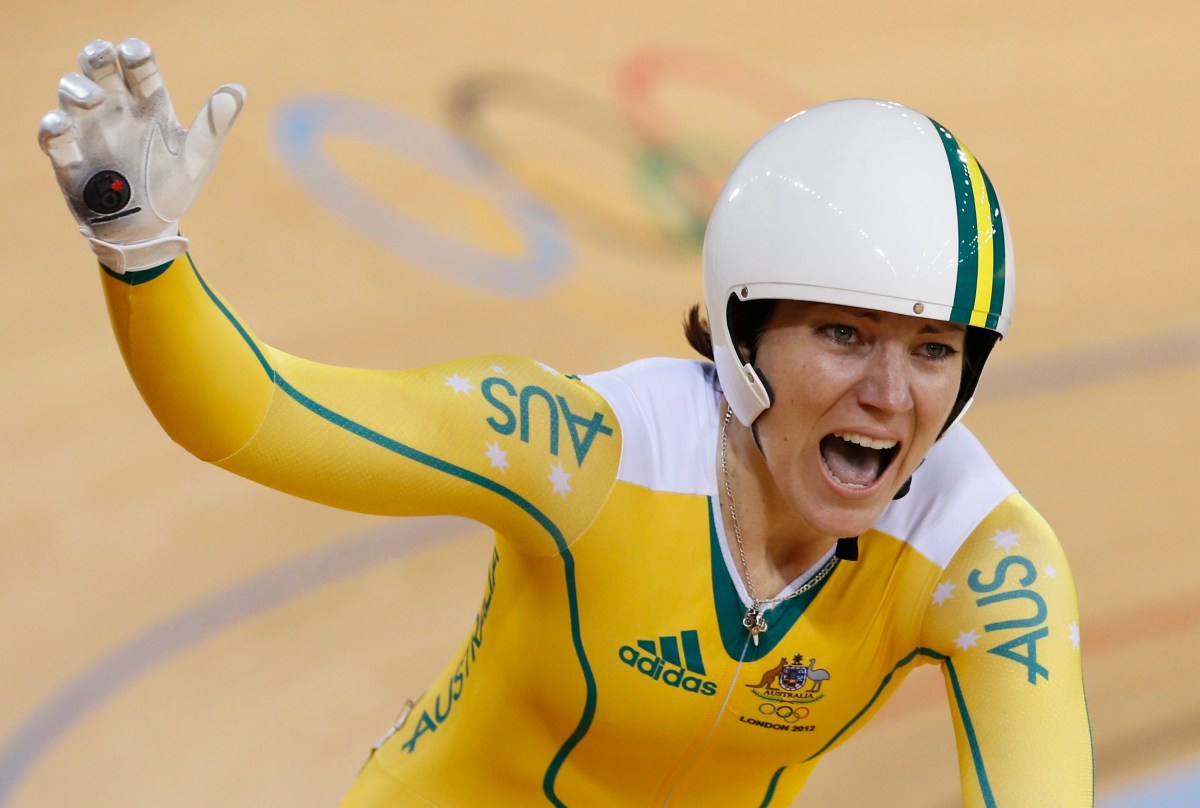
Anna Meares of Australia defeats arch-rival Victoria Pendleton at the 2012 Olympic Games in London. Photo: EPA/Ian Langsdon
Meares said since her retirement, she has had “emotional” conversations with her parents about the sacrifices they made to support her early endeavours, and their hard work is something she carried with her during her competitive career.
“It wasn’t until I retired that they finally told me how hard it was for them,” Meares said.
“I will never earn enough money to be able to repay them, but I know that the pride they had in the things that I’ve done and achieved is payment enough.
“Even as a young person, you know how much time, how much money, how much life is sacrificed in order for you have the opportunities [and] to have the money in an expensive sport.
“I never blamed anyone other than myself if I made mistakes or got losses, but if I won, I was so quick to thank those people because I know that they worked so hard and they don’t get headlines.”
Rising through the cycling ranks as a teenager, Meares made her breakthrough performance at the 2001 Junior World Championships after winning the 500-metre time trial. She said the circumstances surrounding the event gave her belief that she may become an Olympic athlete.
“I didn’t sleep at night, and then I woke up in the morning worried that I was too tired,” she said.
“[But] I still was able to win, and after that, I thought to myself: ‘Maybe, just maybe, I might have a shot at making an Olympics’.”
A year later, Meares would make her Commonwealth Games debut at the 2002 Manchester Games. Although the then-18-year-old took home bronze in the sprint event, it was behind her older sister Kerrie who won two gold medals at the Games.
In the lead up to the 2004 Olympics, the Meares sisters were faced with the unenviable task of competing for just one open spot on the Olympic team – a situation that would place great emotional strain on the young cycling duo.
“We always wanted to have our bond as the precedent, that was the most important thing,” Meares said.
“It was very difficult when Kerrie had to withdraw from selection contention because of injury, because as a sister my heart absolutely bled for her, and as a competitor, it was one less person to worry about.
“I’m just thankful that she’s as incredible human being as she is to still love me … I think this award can’t go without acknowledging her, and acknowledging her influence on both me, on women in cycling, on women in sport, and the path that she laid in front of me.”
With her sister having to withdraw, Meares would travel to Athens for her first Olympics knowing she needed to set a personal best and Olympic record to win gold in the 500-metre time trial.
“I just remember crossing the line feeling the lactic in the legs, but just desperately looking at the scoreboard to see what I had done,” she said.
“When I saw number one next to my name, I absolutely lost it; I was just beside myself [and] had no idea what to do strapped into a bike that’s going 63 kilometres an hour, incapable of comprehending what just happened.”
“I called the family as soon as I got back to the village … when we got home, it was pretty spectacular celebrations.”
Millimetres from disaster in life and cycling
In the four-year lead up to the 2008 Olympics, Meares looked unstoppable. She won nine national championships, one world championship and a Commonwealth Games gold medal.
Yet with only eight months left to before Beijing’s opening ceremony, Meares’s Olympic dream – and life – was almost taken from her.
Competing in a Keirin event at the Cycling World Cup in Los Angeles, she tapped the back wheel of another competitor after a collision occurred in front of her – crashing onto the velodrome surface at more than 60 kilometres an hour. Meares tore several ligaments and tendons in her shoulder, heavily bruised her right hip, suffered burns from sliding along the wooden track and fractured her neck.
Scans later revealed Meares was two millimetres away from a clean break of her CT vertebrae, an injury that could have resulted in quadriplegia or death.
“It could very well have gone the other way,” Meares said.
“I’m very thankful and grateful for the two millimetres for a number of reasons: one, for my life, but two, for what it showed me and what it taught me in the subsequent rehabilitation that came from that.
“I think my perspective on a lot of things shifted from there, and I think that my accident was responsible for the longevity of my career, to be honest.”
Within 10 days of her accident, Meares was back on a training bike.
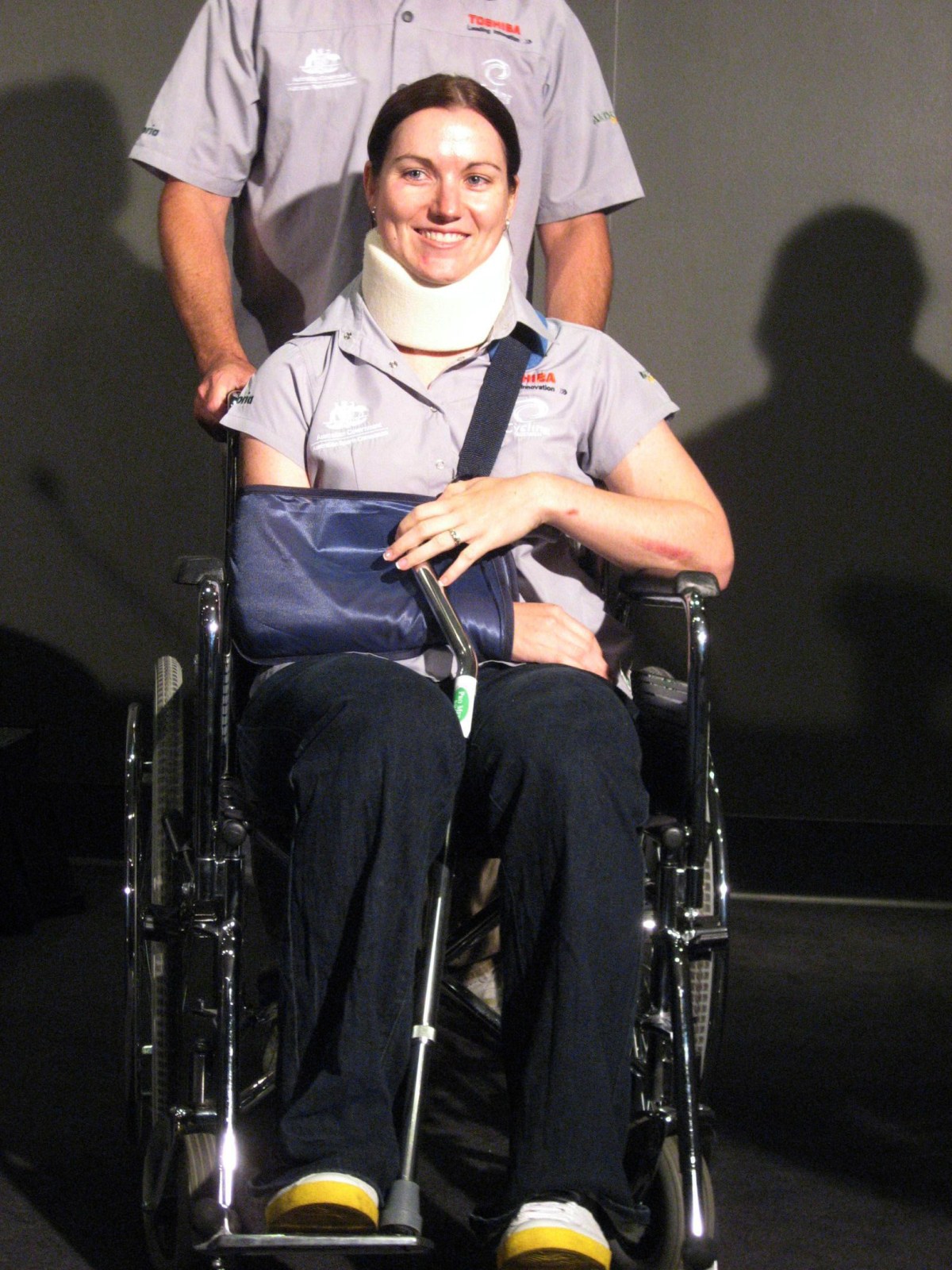
Smiling through the pain: Anna Meares speaks to the media in Adelaide nine days after her near-tragic crash in Los Angeles. Photo: AAP/Steve Larkin
She says her determination to compete at the Beijing Games was a major factor in motivating her comeback.
“Often it’s not until something’s taken from you that you realise how much you want it,” Meares said.
“Basically I said [to my support team]: ‘I need to go that way, you only apply the brakes if it’s absolutely necessary.
“So I was very driven, very strong-willed and very stubborn. Perhaps my youth and naivety helped me in that, because I think even though I was aware that I was hurt, I felt okay within me, even though I understood that I wasn’t.”
During a gruelling rehab process, Meares was locked in a struggle between her mental and physical states. She recalls her body giving “a really strong response of fear” and “locking up” the first time she returned to a velodrome, despite her mind being convinced she could return to the track.
“Even though I had the physical response of locking up, I was pretty desperate to win that battle,” she said.
Her mindset would eventually win the struggle and propel her to Beijing where she competed in front of her parents at an Olympic Games for the first time of her career. She made it all the way to the sprint final against Victoria Pendleton, falling just short of a historic gold medal.
Meares said her opinion of this silver medal has evolved over time after the initial disappointment of finishing second place.
“I was really disappointed when I crossed the line,” Meares said.
“But then it didn’t take long for that to shift to realise that it was actually relief that I was feeling.
“I had been so gung-ho and so hard-nosed about my rehab and making Beijing that I think that was the first time I really stopped and took stock of everything – and it hit me hard emotionally.”
Returning to Adelaide after her second Olympics, Meares found time to reflect, regroup and contemplate whether she wanted to go for gold again in four years’ time. After finding some stability in her personal life, she eventually decided it was going to be “all about London”.
Knowing she would have to beat Pendleton to claim gold, Meares and her team got to work on breaking down hundreds of hours of footage of her rival, mimicking her movements in training, devising strategies and drilling in mental habits to rely on when the final race arrived.
Meares said the three-and-a-half-years of preparation for the one-on-one race was a “frustrating, slow but incredible experience to go through”. Her team eventually settled on a strategy of forcing Pendleton to the front of the race, as statistics showed the British rider won less when leading before the final sprint. Meares also had to sacrifice success in other world title events to keep her strategy a secret from Pendleton.
Meares said when she finally made it to the start line of the gold-medal sprint in 2012, she was “so bought into the plan” and “really confident” in the extensive work her team had put in prior to that day.
“The hard part was that … at the end of the day, my coach Gary West, and all the work they had done in three and a half years prior for this plan and strategy to unfold, now falls on my shoulders in the next one to two minutes,” she said.
Meares lost the first race to Pendleton by a thousandth of a second (0.001) – less than a millimetre – but the result was overturned after the reigning champion was disqualified for impeding Meares’s path on the final straight.
With just one victory standing between them and what they had worked nearly four years for, Meares and coach West decided to play their trump card.
“I don’t feel like there was pressure to execute the plan … I knew what I needed to do,” she said.
As the second race got underway, Mears – leading Pendleton on the first lap – unexpectedly climbed to the top of the track and came to a near standstill, delicately balancing her bike until Pendleton was forced to take her unpreferred position at the front of the race.
“I didn’t do it as well as I had done it in training, but at the end of the day, I did it better than Vicky,” Meares said.
Two laps later, Meares stormed passed her opponent on the back straight, rounded the final turn, and lifted her right arm before crossing the line to take gold in an iconic Australian sporting moment.
Meares finished her historic Olympic career with a bronze medal in the Keirin at the 2016 Rio Olympics, after she led the Australian team out at the opening ceremony as flag bearer.
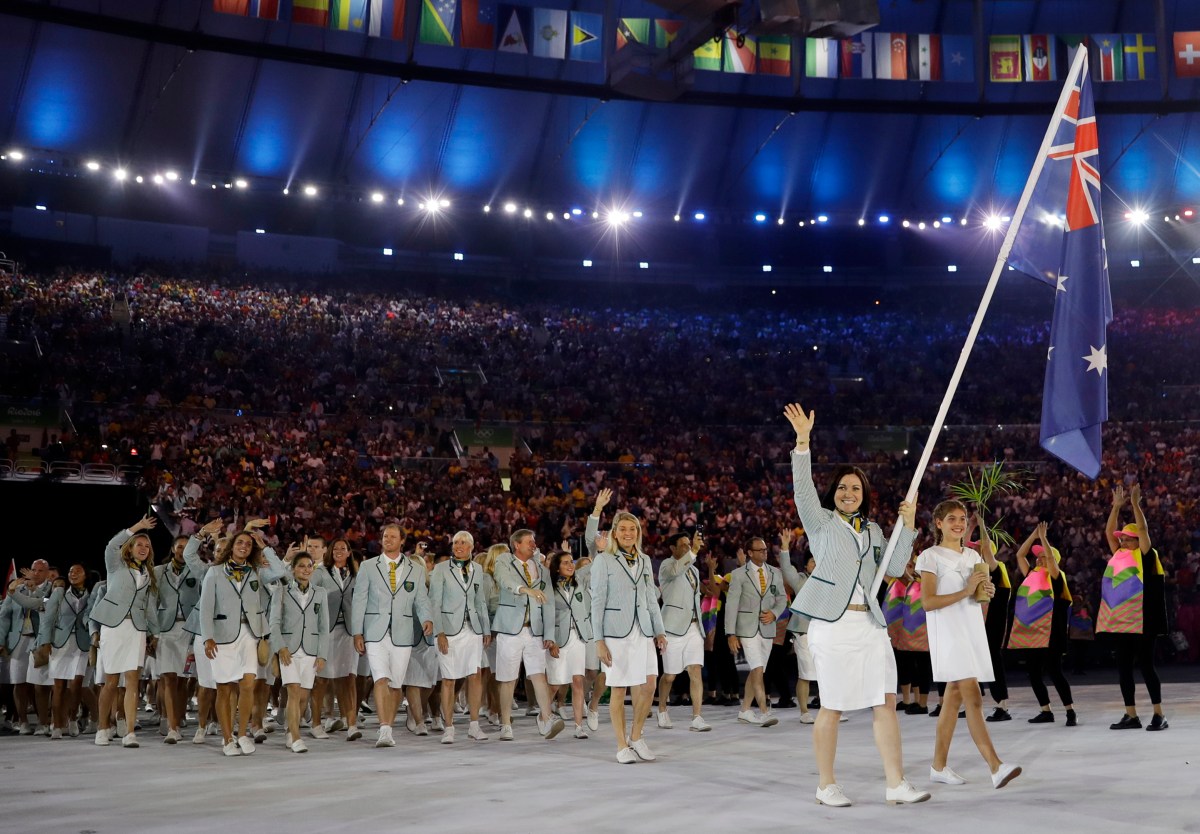
Anna Meares carries the Australian flag during the opening ceremony for the 2016 Summer Olympics in Rio de Janeiro. Photo: AP/David J. Phillip
‘In a fantastic place’: Australia’s flag bearer looks to the future
She also officially became the most successful female track cyclist in history with a record 11th world championship title won in 2015.
But the proud public moments came in stark contrast with the challenges of her personal life, as Meares dealt with the end of her marriage, a raft of lower back injuries, and the physical decline of her coach and close-friend Gary West, who passed away in 2017 nearly a year after he was diagnosed with Motor Neurons Disease.
Doctors also warned her that competing in the 2018 Commonwealth Games may mean she would “never walk without pain” in her post-cycling life, forcing Meares to call time on her career in 2016.
“As a result of that, I, as a woman and as an athlete, took a knock to my confidence, to my self-esteem to my self-belief,” she said.
“And that is really critical to success as a professional athlete to have all those in check, the fact that they were shattered was a real challenge, not just for me, but for my family, for my friends [and] for my team.”
She faced a tumultuous transition out of the rigours of elite competition and into the routine of normal life, after initially feeling an “unbelievable sense of freedom” away from the sport that was later replaced by confusion and the “loss and grief” associated with the end of a career.
“I missed my team, I missed having somewhere to go every day,” Meares said.
“That’s when I started to get a bit confused – why do I miss the structure and routine, which is the one thing I wanted to get rid of? Does that mean that I wasn’t ready to retire?
“There was a lot of confusion around that for me.”
Meares overcame her post-career challenges by finding purpose in caring for others.
She became a foster mum for children between the ages of four and eight, while taking on ambassador roles for the Little Heroes and FightMND foundations, the latter a cause she feels a deep personal connection to, given her former coach’s battle with the illness.
Despite believing she had missed her window to start a family, Meares and her partner Nick welcomed baby Evelyn into the world in February last year.
“[Evelyn] is taking up all of my time, she slows me down, she’s showing me so much and teaching me so much, and it’s an experience I never thought I’d get so I feel like I’m in a fantastic place,” Meares said.
Meares, who is currently the general manager of Commonwealth Games Australia and a commentator for ABC sport, says she has been able to reflect more positively on her career as her retirement has progressed.
“Even though I’ve only been five years into retirement, my life is so different now,” she said.
“I’m extremely proud of my career, extremely proud … I love that I have such a great connection with the Australian public, that they’ve followed me as much as they have, that they’ve ridden my highs and my lows.
“I’m happy with everything … what I mean by that is I wouldn’t change anything because I needed the lows to appreciate the highs.
“And the highest of highs has come with my baby girl.”
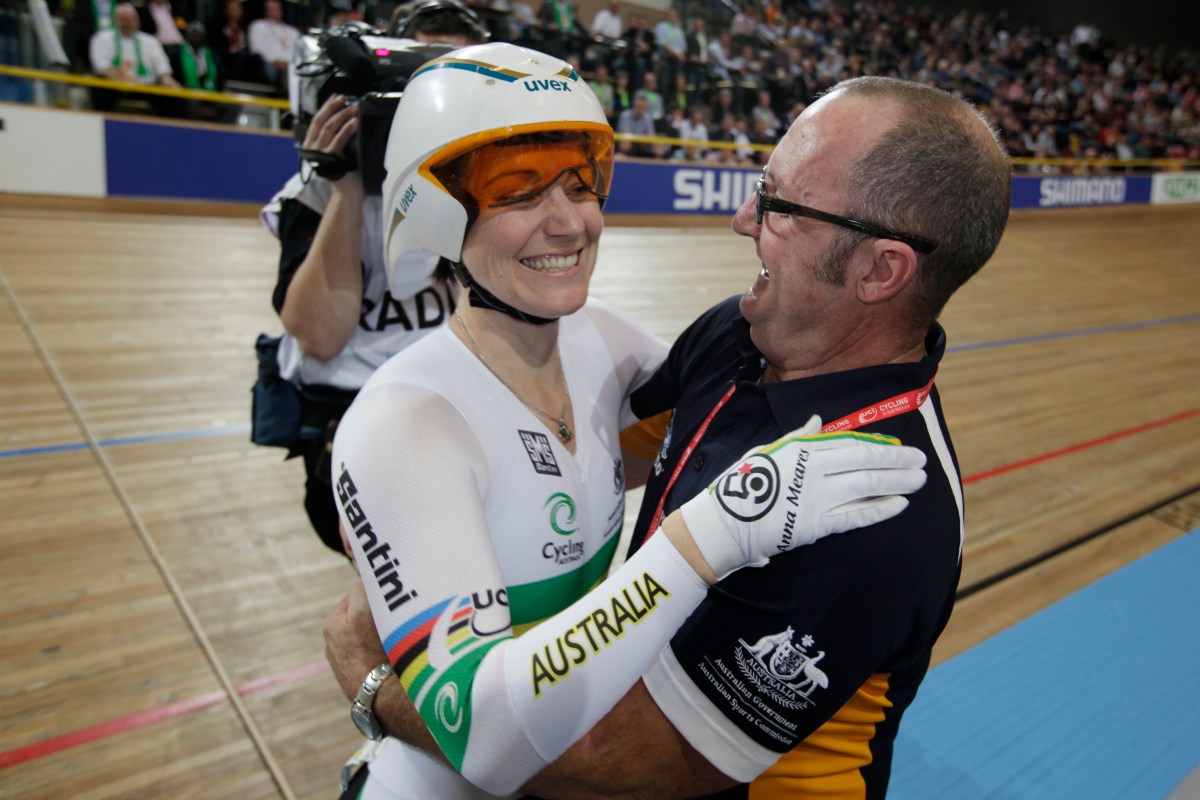
Anna Meares hugs her coach Gary West after becoming sprint world champion in 2011. Photo: AP/Peter Dejong




